Numerous Indonesians choose to go to the United Kingdom to pursue higher education, attracted to the country’s multicultural landscape as well as its universities’ robust intellectual prowess. Many of them have come back to craft great achievements in their home country.
Thousands of Indonesians are now pursuing their higher education in the United Kingdom, attracted to the country’s ethnic and cultural diversity as well as its reputation for excellent higher education standards.
According to British ambassador to Indonesia, ASEAN and Timor-Leste Moazzam Malik, currently there are approximately 3,500 Indonesian students pursuing university degrees – from bachelor’s to doctoral – in the UK, making the country one of the most sought after higher education destinations among Indonesians.
“In fact, one-third of the students sent abroad by Indonesia’s Endowment Fund for Education [LPDP] choose to go to the UK,” Malik said, referring to one of Indonesia’s most prestigious scholarship bodies.
Malik added that the number was ‘just a start’, expecting an increase of Indonesian students in the years to come.
According to data from the Embassy of the Republic of Indonesia and London’s educational attaché Aminudin Aziz, as quoted by tempo.co, technology remains at the top of Indonesians’ preference list when studying in England, followed by natural sciences and social and political sciences.
Indonesian National Commission of Human Rights commissioner Roichatul Aswidah, who earned his Master’s Degree in human rights from Essex University, said the national and ethnic diversity among UK university students became one of the most valuable aspects of the country’s higher education.
According to data from the UK Council for International Student Affairs, from the year 2015 to 2016, there were a total of 438,010 international students in the country’s universities, constituting 19 percent of its total student numbers (link: https://m.tempo.co/read/news/2016/11/21/079821795/apa-kota-terfavorit-mahasiswa-indonesia-di-inggris).
Non-European students hail from countries like China, Malaysia, India, Hong Kong, Nigeria and Saudi Arabia, among others.
“Essex University is the best place to study human rights. The professors and lecturers are human rights practitioners, some of them are working on this issue in the United Nations […] with students coming from all over the world. It is very exciting to exchange experiences with these international students, all the while expanding our network,” Roichatul, well known for her work in advocating the rights of victims of the 1965 massacre, said.
She added that she was deeply humbled when she heard stories from her fellow human rights advocates who hailed from countries with extremely difficult social and political situations.
“So many friends came from conflict-laden countries like Palestine and the former Soviet Union. I learned a lot from them, by understanding how they had to endure very difficult times in their lives,” she explained.
Samiaji Adisasmito, a financial technology (fintech) practitioner who earned his Master’s degree in business and information technology (IT) from Aston University, said that by studying with international students from all over the world, he has expanded his network enormously, something which has helped him greatly in advancing his career in a global setting.
He also lauded the UK’s strong academic tradition, saying that he was taught by ‘the best academics’ while studying there, paving the way for his current success as an entrepreneur.
“It is truly enjoyable to learn from these people. I am able to learn deeply about my subject by having discussions with them on almost a daily basis, while being encouraged to conduct my research autonomously at the same time,” Samiaji, the founder of Jojonomic, a pioneer for mobile reimbursement applications in Southeast Asia.
The application has helped almost 40 companies and over 2,000 employees to save more time and up to 40 percent of their costs through a more efficient, transparent and accountable method of cash reimbursement.
Roichatul and Samiaji are just two examples of Indonesians who benefitted from their UK education and are currently enjoying successful and impactful careers in their home country, giving back by applying their knowledge into practice.
Other prominent Indonesian figures who have earned their degrees in the UK include senior journalist Desi Anwar and presidential staff office deputy for priority programs research and development Yanuar Nugroho, as well as best-selling writer and education activist Ahmad Fuadi, among others.
In order to honor their distinguished achievements, Roichatul and Samiaji have been included in the Study UK Alumni Awards 2017, along with seven of their contemporaries.
Following the success of conducting the UK Alumni Awards 2016 for the first time last year, the British Council recently held the second edition of the awards this year in Indonesia, to honor high-achieving and outstanding Indonesian alumni from UK Higher Education Institutions.
This year, the awards are also being held in 13 other locations: Egypt, Ghana, Greece, Hong Kong, India, Malaysia, Mexico, Nigeria, Pakistan, Saudi Arabia, Thailand, Turkey and the United States.
In Indonesia, the event was held on March 2 at the Fairmont Jakarta in Senayan, Jakarta.
Like last year, the awards were divided into three categories: professional achievement, entrepreneurial and social impact.
The professional achievement award recognizes outstanding alumni who have shown exemplary leadership and distinguished achievements in their profession, while consistently demonstrating the highest level of integrity and character in their career.
Finalists for the category included Yogyakarta’s Gadjah Mada University lecturer and medicinal chemistry laboratory head Dr. Ritmaleni; law firm Jakarta International Law Office owner and Indonesian Bar Association vice president Tahir Musa Luthfi Yazid; as well as Indonesia’s leading photosynthesis researcher and director of the photosynthetic pigments research center at Ma Chung University in Malang, East Java, Tatas Hardo Panintingjati Brotosudarmo.
The entrepreneurial award, meanwhile, honors alumni who are actively involved in initiating or contributing to innovative new ideas or business opportunities with strong growth prospects.
Finalists for the award were kravasia.com founder Ignasius Ryan Hasim, expense reimbursement mobile application Jojonomic cofounder Samiaji Adisasmito, as well as university examination preparation courses provider EduLab’s founder Oki Earlivan Sampurno.
Last but not least, the social impact award acknowledged alumni who have made an exceptional contribution and commitment to creating positive social change and improving lives.
Finalists for the social impact category comprised the University of Indonesia’s (UI) English department lecturer Herlin Putri Indah Destari, who is also active in promoting literacy among Indonesians through her non-profit community-based programs English Art Lab and Theater for Life; human rights activist pushing for the abolition of the death penalty Ricky Gunawan; as well as National Commission for Human Rights (Komnas HAM) commissioner Roichatul Aswidah.
The judging panel for the awards included British Council in Indonesia Director Education and Society Teresa Birks and British Embassy to Indonesia in Jakarta Political Counselor Thérèsa O’Mahony-Heer.
There were lead judges for each category: the entrepreneurial award was headed by retailer Alun-Alun Indonesia Experience’s Managing Director Catharina Widjaja; writer Ahmad Fuadi, also a winner of the previous year’s social impact award, led the social impact category; and Bank Indonesia’s FinTech Deputy Director Junanto Herdiawan ran the professional achievement award.
According to Ahmad, the judges found it very difficult to determine the award recipients as all of the candidates had made great achievements in all aspects of their work.
“We then agreed to use some benchmarks [in judging the finalists], including how their work has impacted the lives of others, through community outreach or nationwide influence or perhaps their work extends internationally? We also assessed the durability of their impact: is it short-term or long-term? Finally, we came up with a list,” Ahmad told The Jakarta Post regarding the assessment method.
Catharina, meanwhile, explained that for a finalist to win the entrepreneurial category, their business had to demonstrate strong growth prospects.
Assessment difficulties aside, the panel of judges ultimately decided on three winners for this year’s awards. They were Tatas Hardo Panintingjati Brotosudarmo for the professional achievement award, Samiaji Adisasmito for the entrepreneurial award and Ricky Gunawan for the social impact award.
According to Country Director of British Council in Indonesia Paul Smith OBE, the awards seek to celebrate the great things that happen when great minds gather and learn together.
“Like the students from the US who study in the UK to bring back the entrepreneurial spirit of the country back to the US, these great Indonesian minds and talents who were fortunate and privileged to experience the best universities in the UK are also bringing back impactful actions to Indonesia,” Smith said in his opening remarks during the event.
Smith said he hoped that all the great minds who gathered during the awards ceremony were able to continue to contribute more to Indonesia’s socio-economic trajectory as Indonesia was heading toward what he called ‘its great future’.
Malik, meanwhile, emphasized the importance of international education in a globalized world rife with tension.
“We now live in a highly interconnected world, where bad things go across borders, so do good things. Therefore, in order to solve problems, we have to go across borders, not just physically but also mentally by being able to understand other people’s experiences,” Malik said.
Study UK Alumni Awards 2017 winners:
What makes them tick?
Tatas Hardo Panintingjati Brotosudarmo
Winner of the professional achievement award
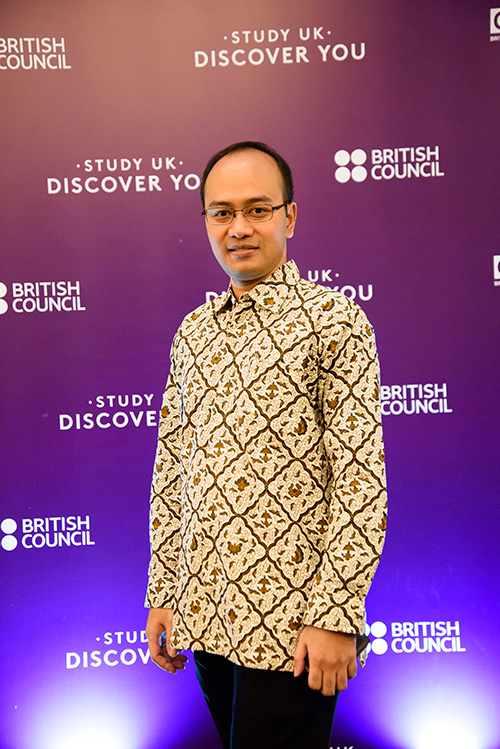 Tatas studied for his PhD in molecular and cellular biology at the University of Glasgow. He is a leading researcher of photosynthesis pigments in Indonesia. He is currently a lecturer and director of the research center for photosynthesis pigments at Ma Chung University, Malang, East Java.
While pursuing his doctoral degree at the University of Glasgow, he had the opportunity to study under one of the most respected scientists in his field, Richard Cogdell, with whom he had regular intense discussions daily. This has enabled him to enjoy more international exposure and research collaboration. Tatas says that what he learned from his UK study experience has been invaluable and has shaped his perspective about building a nation through research and science.
He was invited to attend the 63rd Lindau Nobel Laureate Meeting in Germany in 2013, and is the president-elect of the Indonesia Chemical Society. Tatas’ research results influenced government policy on the use of synthetic food coloring to ensure a more environmentally sustainable solution.
“We can extract natural pigment from plant leaves, flowers and roots. Indonesia, unfortunately, has long abandoned the use of natural dye because it is expensive to extract. Synthetic coloring, however, is very dangerous as it can make children hyperactive or cause certain types of tumors,” Tatas told the Post upon receiving the award.
There are optimistic signs that Indonesians will ultimately turn to natural coloring again, since people are becoming more and more health-conscious, Tata said.
Tatas is currently studying the use of natural pigments as indicators of the health of herbs and plants on a plantation. He said the method utilizing the multi-spectral digital pigment assessor is much more efficient and accurate than the manual work done by plantation workers to assess plant health.
He said that a lack of proper facilities remained the biggest challenge for Indonesian researchers to advance science in the country.
“Indonesians have an abundance of intelligent people who study abroad. When they come back to the country, it is unfortunately almost as though they are being ‘disarmed’ from their duties due to the lack of adequate facilities,” he explained.
Tatas studied for his PhD in molecular and cellular biology at the University of Glasgow. He is a leading researcher of photosynthesis pigments in Indonesia. He is currently a lecturer and director of the research center for photosynthesis pigments at Ma Chung University, Malang, East Java.
While pursuing his doctoral degree at the University of Glasgow, he had the opportunity to study under one of the most respected scientists in his field, Richard Cogdell, with whom he had regular intense discussions daily. This has enabled him to enjoy more international exposure and research collaboration. Tatas says that what he learned from his UK study experience has been invaluable and has shaped his perspective about building a nation through research and science.
He was invited to attend the 63rd Lindau Nobel Laureate Meeting in Germany in 2013, and is the president-elect of the Indonesia Chemical Society. Tatas’ research results influenced government policy on the use of synthetic food coloring to ensure a more environmentally sustainable solution.
“We can extract natural pigment from plant leaves, flowers and roots. Indonesia, unfortunately, has long abandoned the use of natural dye because it is expensive to extract. Synthetic coloring, however, is very dangerous as it can make children hyperactive or cause certain types of tumors,” Tatas told the Post upon receiving the award.
There are optimistic signs that Indonesians will ultimately turn to natural coloring again, since people are becoming more and more health-conscious, Tata said.
Tatas is currently studying the use of natural pigments as indicators of the health of herbs and plants on a plantation. He said the method utilizing the multi-spectral digital pigment assessor is much more efficient and accurate than the manual work done by plantation workers to assess plant health.
He said that a lack of proper facilities remained the biggest challenge for Indonesian researchers to advance science in the country.
“Indonesians have an abundance of intelligent people who study abroad. When they come back to the country, it is unfortunately almost as though they are being ‘disarmed’ from their duties due to the lack of adequate facilities,” he explained.
Samiaji Adisasmito
Winner of the entrepreneurial award
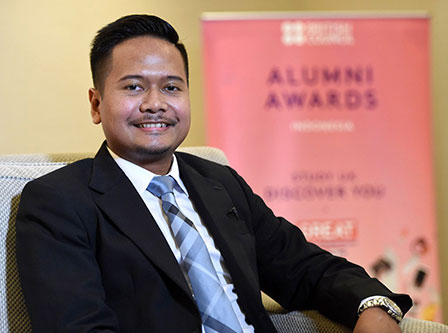 Samiaji earned his master’s degree in business and information technology from Aston University. In 2015, he co-founded Jojonomic, a pioneer in fintech for the Southeast Asia region, being the first expense reimbursement mobile application in the region.
“A similar solution already exists in the US, Concur and Expensify mobile applications. However Jojonomic Pro is the only one in the market with cash advance feature helping employees on business trips to constantly update their expenses accordingly to the initial disbursement. Therefore, companies no longer have to manually record employees cash advances, which are inefficient,” he explained to the Post.
According to Samiaji, the application also has custom approval flow management, enabling employees to provide real-time information on their expenses by taking selfies with their bills and uploading them to the system.
In 2016, he was invited by Google to participate in the first Google Accelerator program in Silicon Valley, the US. The application has helped almost 40 companies and over 2,000 employees save time and up to 40 percent of their costs. It has also encouraged companies to go paperless.
The application has been updated with a digital attendance feature, allowing employees who are required to be mobile and move around outside of the office to upload proof of their work activities, giving them little room to shirk their job responsibilities.
Encouraged by the application’s easy adoption by Indonesians, Samiaji said that he planned to expand his pioneering business to other countries in the Southeast Asia region, such as Malaysia and Singapore.
“Hopefully, winning this award can help me gain even more international exposure, making it easier for me to expand my business to other areas,” he said.
Samiaji earned his master’s degree in business and information technology from Aston University. In 2015, he co-founded Jojonomic, a pioneer in fintech for the Southeast Asia region, being the first expense reimbursement mobile application in the region.
“A similar solution already exists in the US, Concur and Expensify mobile applications. However Jojonomic Pro is the only one in the market with cash advance feature helping employees on business trips to constantly update their expenses accordingly to the initial disbursement. Therefore, companies no longer have to manually record employees cash advances, which are inefficient,” he explained to the Post.
According to Samiaji, the application also has custom approval flow management, enabling employees to provide real-time information on their expenses by taking selfies with their bills and uploading them to the system.
In 2016, he was invited by Google to participate in the first Google Accelerator program in Silicon Valley, the US. The application has helped almost 40 companies and over 2,000 employees save time and up to 40 percent of their costs. It has also encouraged companies to go paperless.
The application has been updated with a digital attendance feature, allowing employees who are required to be mobile and move around outside of the office to upload proof of their work activities, giving them little room to shirk their job responsibilities.
Encouraged by the application’s easy adoption by Indonesians, Samiaji said that he planned to expand his pioneering business to other countries in the Southeast Asia region, such as Malaysia and Singapore.
“Hopefully, winning this award can help me gain even more international exposure, making it easier for me to expand my business to other areas,” he said.
Ricky Gunawan
Winner of the social impact award
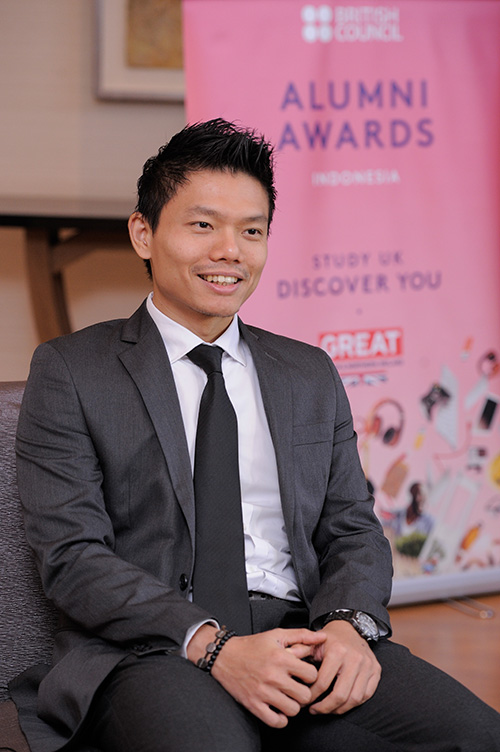 Ricky earned his master’s degree in theory and practice in human rights from the University of Essex. His work focuses on abolishing the death penalty, revising drug laws and protecting the rights of Indonesia’s most vulnerable communities. His work seeks to improve lives and restore hope. Thousands of people globally have become aware of unfair trials experienced by prisoners on death row. In 2016, he delivered an emotional plea at the UN General Assembly, demanding that states abolish the death penalty.
He says that studying at the University of Essex gave him an unparalleled opportunity to study and work under professors who are experts in their fields.
“The most difficult challenge of abolishing the death penalty in Indonesia is the state’s lack of political commitment,” he said. “As long as the powers that be view the death penalty as a panacea to solve complex problems, such as drug trafficking, the public will be blindingly guided into accepting this form of punishment.”
He mentioned several countries, such as the UK, the Netherlands and France, where society eventually accepted the abolition of the death penalty after initially resisting it.
“The government has to be aware that in order to solve complex issues like drug trafficking, we have to examine the root of the problem: has the country been successful in providing welfare and a sense of security to its citizens? Many other problems, like prison overcrowding, also need to be tackled to solve this drug issue instead of using the death penalty as a shortcut approach,” he said.
Ricky earned his master’s degree in theory and practice in human rights from the University of Essex. His work focuses on abolishing the death penalty, revising drug laws and protecting the rights of Indonesia’s most vulnerable communities. His work seeks to improve lives and restore hope. Thousands of people globally have become aware of unfair trials experienced by prisoners on death row. In 2016, he delivered an emotional plea at the UN General Assembly, demanding that states abolish the death penalty.
He says that studying at the University of Essex gave him an unparalleled opportunity to study and work under professors who are experts in their fields.
“The most difficult challenge of abolishing the death penalty in Indonesia is the state’s lack of political commitment,” he said. “As long as the powers that be view the death penalty as a panacea to solve complex problems, such as drug trafficking, the public will be blindingly guided into accepting this form of punishment.”
He mentioned several countries, such as the UK, the Netherlands and France, where society eventually accepted the abolition of the death penalty after initially resisting it.
“The government has to be aware that in order to solve complex issues like drug trafficking, we have to examine the root of the problem: has the country been successful in providing welfare and a sense of security to its citizens? Many other problems, like prison overcrowding, also need to be tackled to solve this drug issue instead of using the death penalty as a shortcut approach,” he said.
The finalists: high achieving Indonesians
Professional achievement award
Dr. Ritmaleni
University of Bristol
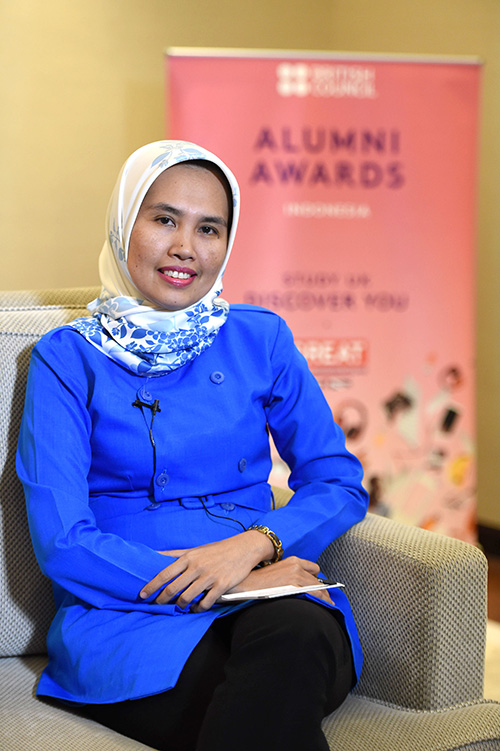 Dr. Ritmaleni earned a PhD in chemistry at the University of Bristol. She is now a lecturer at Gadjah Mada University (UGM) in Yogyakarta, as well as the head of the university’s medicinal chemistry laboratory. She was selected to join the ASEAN science leadership program in 2016 in Thailand. She was also the director of UGM’s curcumin research center. Her research on synthetic organic chemistry has received many national and international awards. She has developed products for medicine in the areas of cancer and TB prevention, as well as anti-aging products that will soon be commercialized.
Dr. Ritmaleni says that while studying in the UK she learned how to be a smart researcher, particularly benefiting from the strong scientific environment and the wide access to publications available in the University of Bristol. As a graduate of a UK university she notes that it is easier for her to work in international laboratories, such as in the Netherlands and Japan.
Dr. Ritmaleni earned a PhD in chemistry at the University of Bristol. She is now a lecturer at Gadjah Mada University (UGM) in Yogyakarta, as well as the head of the university’s medicinal chemistry laboratory. She was selected to join the ASEAN science leadership program in 2016 in Thailand. She was also the director of UGM’s curcumin research center. Her research on synthetic organic chemistry has received many national and international awards. She has developed products for medicine in the areas of cancer and TB prevention, as well as anti-aging products that will soon be commercialized.
Dr. Ritmaleni says that while studying in the UK she learned how to be a smart researcher, particularly benefiting from the strong scientific environment and the wide access to publications available in the University of Bristol. As a graduate of a UK university she notes that it is easier for her to work in international laboratories, such as in the Netherlands and Japan.
Tahir Musa Luthfi Yazid
University of Warwick
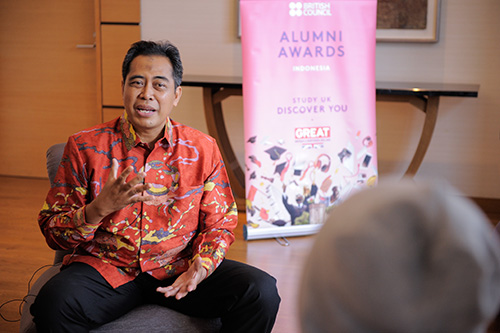 Tahir earned a master’s degree in law from the University of Warwick. He now owns the Jakarta International Law Office, a law firm based in Jakarta. He also serves as the vice president of the Indonesian Bar Association. Additionally, Tahir was one of the members of the Presidential Advisor office to select judges for the Constitutional Court in 2008. Thanks to his intensive and extensive professional experiences, he was invited as a visiting professor to Gakushin University in Tokyo.
Tahir’s legal training from the University of Warwick proved essential when he worked on an international case in Singapore, where he defended an Indonesian worker in a murder case. This case was a landmark case for Indonesian workers abroad.
Tahir earned a master’s degree in law from the University of Warwick. He now owns the Jakarta International Law Office, a law firm based in Jakarta. He also serves as the vice president of the Indonesian Bar Association. Additionally, Tahir was one of the members of the Presidential Advisor office to select judges for the Constitutional Court in 2008. Thanks to his intensive and extensive professional experiences, he was invited as a visiting professor to Gakushin University in Tokyo.
Tahir’s legal training from the University of Warwick proved essential when he worked on an international case in Singapore, where he defended an Indonesian worker in a murder case. This case was a landmark case for Indonesian workers abroad.
Entrepreneurial award
Ignasius Ryan Hasim
University of Bath
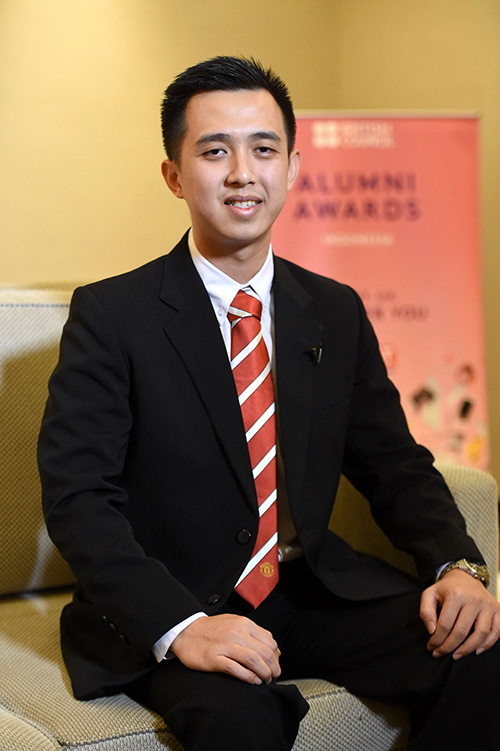 Ignasius Ryan Hasim earned a master’s degree in accounting and finance at the University of Bath. Ignasius created kravasia.com, a tech-based start-up company connecting local batik craftspeople with potential customers.
Previously, he was involved with ruangguru.com, a marketplace connecting tutors and students. Ignasius hopes that technology can help in tackling the challenges faced by local craftspeople, by helping them tap into a potential and strategic market niche. His start-up also aims at providing additional services, such as free product photo shoots and digital marketing assistance, to help the local creative industry thrive in the marketplace. Ignasius says that studying in the UK is a life-changing experience that broadened his horizons and was fundamental to his career as an entrepreneur. The UK’s multicultural and dynamic environment strengthened his understanding of the economic potential that could be produced by synergizing culture and creativity, something that inspired him to help craftspeople through kravasia.com.
Ignasius Ryan Hasim earned a master’s degree in accounting and finance at the University of Bath. Ignasius created kravasia.com, a tech-based start-up company connecting local batik craftspeople with potential customers.
Previously, he was involved with ruangguru.com, a marketplace connecting tutors and students. Ignasius hopes that technology can help in tackling the challenges faced by local craftspeople, by helping them tap into a potential and strategic market niche. His start-up also aims at providing additional services, such as free product photo shoots and digital marketing assistance, to help the local creative industry thrive in the marketplace. Ignasius says that studying in the UK is a life-changing experience that broadened his horizons and was fundamental to his career as an entrepreneur. The UK’s multicultural and dynamic environment strengthened his understanding of the economic potential that could be produced by synergizing culture and creativity, something that inspired him to help craftspeople through kravasia.com.
Oki Earlivan Sampurno
Royal Holloway, University of London
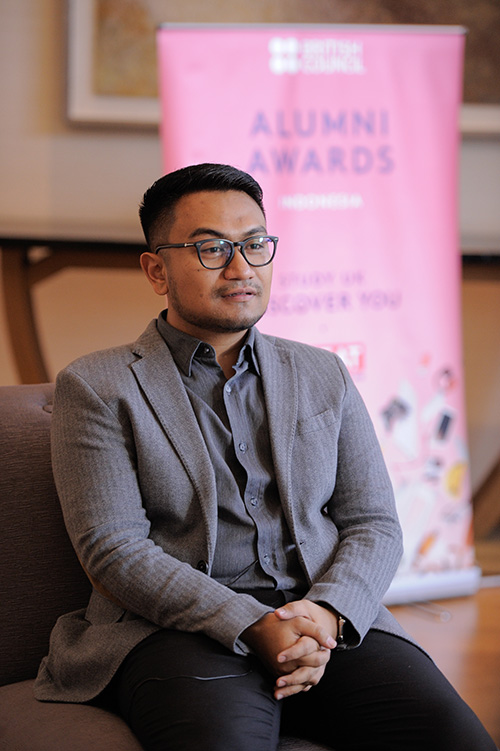 After completing his Master’s degree in business and management at Royal Holloway, University of London, Oki was able to expand his business, EduLab, which offers university examination preparation courses. Currently, EduLab has 25 branches in 14 cities with thousands of students. Oki also owns a private school, Edu Global School, offering primary and secondary education. The schools have expanded to three cities
Oki believes that studying in the UK has taken him to a different level of academic comprehension regarding his study field, while equipping him with necessary applicable skills. Both things have changed the way he thinks and makes decisions for the better.
According to him, his study time in the UK does not provide him with theories only, but also the skills to apply them into business practices through practical experiences. These practical skills are gained through numerous consultation projects with various companies during his study time.
After completing his Master’s degree in business and management at Royal Holloway, University of London, Oki was able to expand his business, EduLab, which offers university examination preparation courses. Currently, EduLab has 25 branches in 14 cities with thousands of students. Oki also owns a private school, Edu Global School, offering primary and secondary education. The schools have expanded to three cities
Oki believes that studying in the UK has taken him to a different level of academic comprehension regarding his study field, while equipping him with necessary applicable skills. Both things have changed the way he thinks and makes decisions for the better.
According to him, his study time in the UK does not provide him with theories only, but also the skills to apply them into business practices through practical experiences. These practical skills are gained through numerous consultation projects with various companies during his study time.
Social impact award
Herlin Putri Indah Destari
University of Warwick
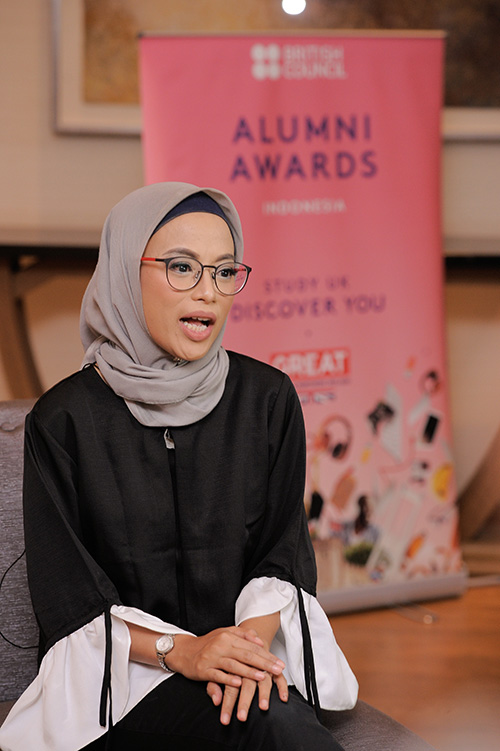 Herlin pursued a master’s degree in drama and theater in education at the University of Warwick. Herlin currently lectures at the English Literature department of University of Indonesia’s (UI) school of culture. She established the English Art Lab, a community-based non-profit movement that aims at empowering children and young people through creative education.
She also initiated English Without Borders, a social program focusing on teaching English for vulnerable and underprivileged children and teenagers. Her love and passion for theater also inspired her to set up Theater for Life, another organization focusing on empowering disadvantaged youngsters through activities involving theater.
Herlin pursued a master’s degree in drama and theater in education at the University of Warwick. Herlin currently lectures at the English Literature department of University of Indonesia’s (UI) school of culture. She established the English Art Lab, a community-based non-profit movement that aims at empowering children and young people through creative education.
She also initiated English Without Borders, a social program focusing on teaching English for vulnerable and underprivileged children and teenagers. Her love and passion for theater also inspired her to set up Theater for Life, another organization focusing on empowering disadvantaged youngsters through activities involving theater.
Roichatul Aswidah
University of Essex
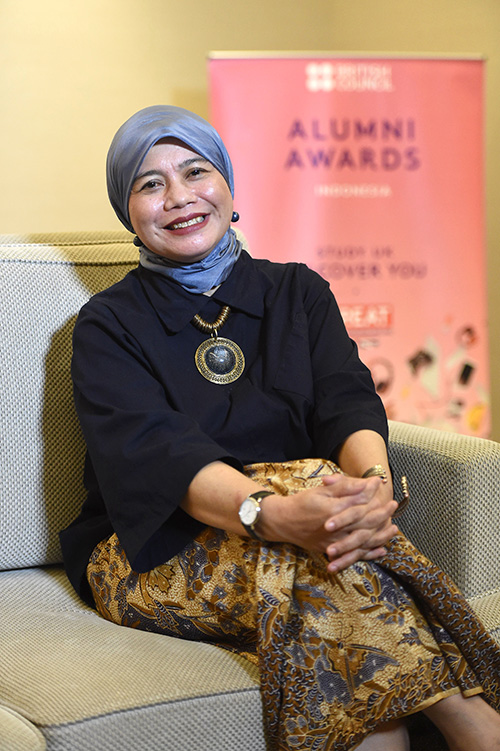 Roichatul studied human rights at the University of Essex. She currently serves as a commissioner for the National Commission of Human Rights (Komnas HAM). As a Komnas HAM commissioner, she is able to promote and protect human rights of minority communities and vulnerable groups in Indonesia. Her team’s work has directly impacted the state of Indonesia’s human rights protection, mainly focusing on resolving past human rights abuse cases, like victims of the 1965 massacre.
One of the milestones of the team’s work is the establishment of criteria and procedures to enable the commission to issue up to 4,000 letters acknowledging the status of the 1965 massacre victims, enabling them to access the national healthcare program and other social protection programs granted by the government. Roichatul says that she benefited greatly from learning directly from her professors, who have intensive and extensive experience in the field of human rights, at the University of Essex. Combining theory with practical experience has enormously enhanced her study time. She adds that she appreciated the UK’s tolerance and multicultural atmosphere.
Roichatul studied human rights at the University of Essex. She currently serves as a commissioner for the National Commission of Human Rights (Komnas HAM). As a Komnas HAM commissioner, she is able to promote and protect human rights of minority communities and vulnerable groups in Indonesia. Her team’s work has directly impacted the state of Indonesia’s human rights protection, mainly focusing on resolving past human rights abuse cases, like victims of the 1965 massacre.
One of the milestones of the team’s work is the establishment of criteria and procedures to enable the commission to issue up to 4,000 letters acknowledging the status of the 1965 massacre victims, enabling them to access the national healthcare program and other social protection programs granted by the government. Roichatul says that she benefited greatly from learning directly from her professors, who have intensive and extensive experience in the field of human rights, at the University of Essex. Combining theory with practical experience has enormously enhanced her study time. She adds that she appreciated the UK’s tolerance and multicultural atmosphere.
This article brought to you by:



